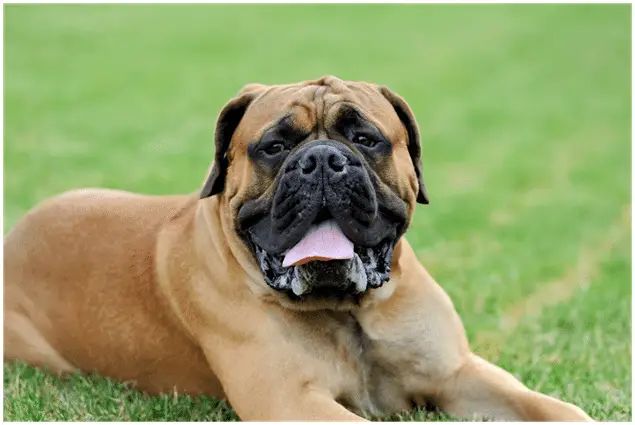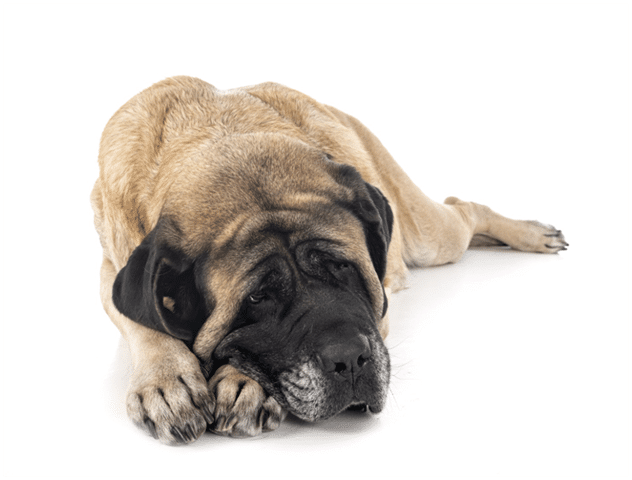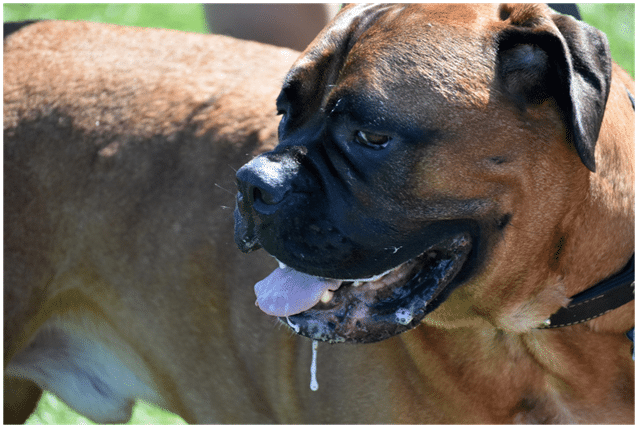The English Mastiff is prone to breathing difficulties due to their short snouts, which can result in heavy breathing or snoring. But there are many other reasons for this loud behavior. So, why do English Mastiffs breathe so hard?
There are many reasons why an English Mastiff may experience rapid or heavy breathing. This can be caused by anxiety, fear, high blood pressure, heavy exercise, or feeling hot, among many other reasons.
For a complete overview of the reasons why your English Mastiff may be breathing so hard, be sure to read until the end of this article!
Typical Causes of Heavy Breathing in the English Mastiff
As briefly mentioned previously, there are a whole bunch of reasons why an English Mastiff might experience heavy breathing.
As a pet owner, it is your responsibility to determine why your dog is behaving that way, and we hope that this article will help you do so! Let’s check out some of the typical causes below:
Recovering From Exercise
One of the biggest causes of heavy breathing in an English Mastiff is exercise. Like humans, English Mastiffs will find that their breathing speed increases after running or exercising for a while.
Dogs will begin breathing much harder after physical activity because their body needs more oxygen to fuel the muscles.
This is why it is important to always bring water with you when exercising your dog, as they will become dehydrated quickly. The same logic applies when you exercise, yes, you, the human!
Feeling Hot

One possible reason your English Mastiff is breathing so hard is that they feel hot. Mastiffs are a large breed of dog that can quickly become overheated. If your Mastiff is panting and drooling, it’s probably a good idea to take them inside and cool them down.
Giving them lots of water should be a priority in these situations.
You can also put a cold pack on their neck or give them some ice to lick.
If your dog tends to breathe faster during the summer but slower in the winter, you don’t have to worry. It is most likely due to their reaction to the temperature outside.
But of course, you will want to make an effort to regulate your English Mastiff’s temperature, whether it is being too hot or too cold.
Since heavy breathing is likely a sign of it being too hot for your dog, you can also consider taking them for a swim or bathing them.
Not only is this fun for your pup, but it will also help to regulate their body temperature so they can be comfortable.
If you are looking for ways to keep your English Mastiff cool this summer, consider installing an air conditioner in your house or apartment.
You could also take them with you on errands or to the park so they can get some exercise and fresh air.
Emotions
Your dog may also breathe harder due to strong emotions. For example, if your dog is feeling anxious or scared, they may start breathing heavier as a way of trying to cope with those feelings.
If your Mastiff is exhibiting this type of behavior, it is essential to try and calm them down as much as possible.
You can do this by providing a safe and comfortable environment for them and soothing them with gentle words and touch. Try to avoid moving them around a lot, as this might only become more frightening for your pup.
We’ll elaborate more on the specific emotions that may cause heavy breathing in your four-legged friend later in this article, however.
Anxiety
Anxiety is one of the reasons your English Mastiff may experience rapid breathing. There are many different types of stress, including separation anxiety, performance anxiety, social anxiety, and generalized anxiety disorder.
Whether you’re more worried about your dog’s physical health or mental health, it’s essential to try and figure out the root of their problem.
“Dogs can get bored or lonely when left home alone for too long. This can cause them to become anxious and over-excited, which will lead them to pant heavily.“
If the panting becomes too heavy, it could signify hyperventilation. If this becomes a regular occurrence for your Dog, they might have some respiratory problem, and you should take them to the vet. We’ll also touch on this subject later, so be sure to read on!
Fear
If your English Mastiff’s breathing rate increases rapidly, it may be because they are in fear. Fear can cause a dog’s heart rate and respiratory rate to increase, which leads to them panting heavily.
To solve the problem, try to understand what is causing this fear in your dog. If you find that they are avoiding another pet in the house or a person, that is likely an indication that they are afraid of that particular person or pet.
If you believe that your dog is afraid, try to comfort them and make sure they feel safe. Give them a lot of love and attention, as well as a few treats. That should help your pup to feel much better!
Aging
Aging is one of the most common causes of heavy breathing in dogs. As dogs get older, additional risk factors need to be considered. Their lungs will lose some of their elasticity, and they may begin to breathe more heavily as a result.
If your dog is aging, make sure to take them to the vet regularly for checkups so that any potential health problems can be caught and treated early.
If your dog is young, check with your vet to ensure that they are not suffering from any respiratory issues, which we will discuss later.
Experiencing Pain

If your dog is in pain, it may experience breathing difficulties and display excessive panting. One of the causes of heavy breathing in English Mastiffs is being overheated and dehydrated.
However, it can also be a sign of severe illness or injury. If you are concerned about how your dog is breathing, call up your veterinarian for advice.
Think about the last time you stubbed your toe or cut yourself; you probably began breathing harder to control the pain.
Your dog will react in the same way. When a dog is in pain, its respiratory system speeds up as a way to bring more oxygenated blood to the site of the injury.
High Blood Pressure
Although not the most common cause of accelerated breathing, if you notice that your dog’s breathing rhythm has increased, it may be due to higher blood pressure.
The medical term for high blood pressure in dogs is “hypertension,” It usually results from an underlying condition. For example, kidney disease or heart problems can cause your dog to have higher than normal blood pressure.
If you notice that your English Mastiff has started to breathe faster, especially at unexpected times, take him to the veterinarian for a checkup.
Ingestion of Toxins
If your dog ingested toxic substances, it will likely display abnormal panting. You should take them to the vet or call animal control if you think they have eaten something poisonous.
Toxins for dogs include:
- Rodenticides: Poisonous substances that kill rats or mice. These can come in the form of a pellet, block, or paste.
- Insecticides: Poisonous substances used to kill insects. Can come in the form of a powder, granules, aerosol, or liquid.
- Herbicides: Poisonous substances used to kill plants. Comes in solid or liquid form.
- Fertilizers: Contains nitrogen and phosphorus, which is harmful to dogs if ingested.
- Chemicals: Cleaning agents, automotive fluids, etc. It can be fatal if ingested in high quantities.
Therefore, if you suspect your dog has had close contact with any of these, seek urgent medical attention!
If there is a chance that they may have licked, drank, or eaten some, followed by heavy breathing, it is an emergency and should be treated as a life-threatening condition.
Respiratory Problems

If you do not feel that any of the previously mentioned factors may be causing your dog’s heavy breathing, they may genuinely have a respiratory problem that must be addressed.
Some typical breathing troubles in dogs include:
- Brachycephalic Syndrome: There are a number of different things that can cause airway obstruction in dogs, but the most common cause is a condition called brachycephalic syndrome. This condition affects dogs with short snouts, such as Bulldogs, Pugs, and English Mastiffs. Their nasal passages are often too small to breathe easily, leading to difficulty breathing and other respiratory problems. If your dog has this syndrome, it will likely need surgery to help improve its breathing.
- Kennel Cough: This is a highly contagious respiratory infection most commonly seen in puppies and dogs that spend a lot of time in boarding kennels or shelters. Dogs with kennel cough will often exhibit a dry, hacking cough and have difficulty breathing. Treatment typically involves antibiotics and rest.
- Lung Cancer: Although lung cancer is less common in dogs than in humans, it can still occur. Dogs with lung cancer often have a dry cough and difficulty breathing. There is no cure for lung cancer, but treatment can prolong your dog’s life.
If you are concerned that your English Mastiff may be suffering from a respiratory problem, please take them to the vet for an evaluation.
Early diagnosis and treatment of respiratory issues are essential for your dog’s health and well-being.
Final thoughts
English Mastiffs are among the giant dog breeds and typically live a healthy life of up to 12 years. They can also breathe heavily, but this is normal for them because of their size!
If you’re concerned about the heavy breathing of your English Mastiff, consult a veterinarian who will be able to provide an accurate diagnosis for potential health conditions.
In general, however, they don’t have any severe conditions that may hinder their quality of life or cause death due to respiratory failure, although they remain a possibility. Thanks for reading!


